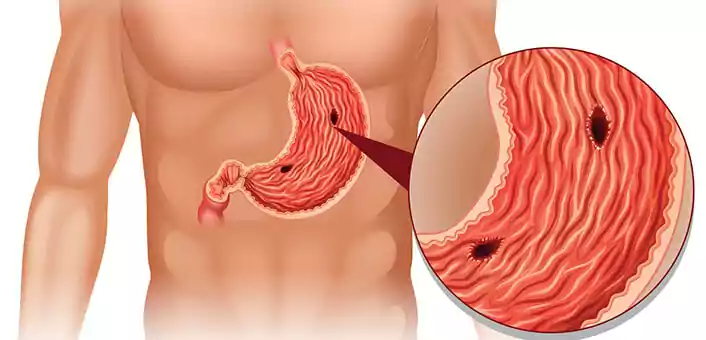PCOS test is based on the Rotterdam criteria for diagnosing PCOS.

Acid Reflux
20% of American adults experience heartburn due to acid reflux at least once every week. Many of them have chronic acid reflux, which is called gastroesophageal reflux disease, or GERD. 10% of Americans develop painful ulcers as a result. Ulcers are painful sores or breaks in the lining of the esophagus or stomach or duodenum (the uppermost part of the small intestine that joins to the lower end of the stomach). Chronic acid reflux or GERD is a major risk factor for ulcers.
An ulcer is formed when the thick mucosal layer that protects the sensitive cells lining the inside of the stomach (or esophagus or duodenum) is eroded, exposing the internal delicate cell lining. The digestive juices eat away at the exposed lining to cause a wound or an ulcer. Duodenal ulcers are the most common, followed by stomach ulcers and finally esophageal ulcers, which are comparatively rare.
How severe the symptoms are will depend upon how severe your ulcer is. The most common symptom is a severe pain or a burning sensation in the area between the chest and navel (belly button). Pain is intense when the stomach is empty and can last for a few minutes to a few hours.
Other signs and symptoms that can be experienced include:
An ulcer is caused when the stomach acid and other digestive enzymes eat away at the inner lining of the digestive tract. The digestive lining is covered with a thick mucosal layer that protects against acid. An ulcer could develop if (a) the amount of acid increases, or (b) the mucosal layer thickness is reduced. The most common causes of ulcers include GERD, an H. pylori infection and regular use of certain medications.
GERD often causes inflammation of the esophagus, called esophagitis. Chronic esophagitis may cause esophageal ulcers. Constant backflow of acid from the stomach erodes the lining of the esophagus causing ulcers. Esophageal ulcers can be shallow or deep, depending on the severity of the acid reflux.
Helicobacter pylori is known to cause gastric and duodenal ulcers. H. pylori is a bacterium that is notorious in causing many digestive problems including GERD and dyspepsia. It creates an environment of low acid within the stomach so that it can thrive. Low stomach acid is now well recognized as a cause of GERD. The bacterium colonizes within the mucosal layer and reduces its thickness. It causes inflammation of the underlying tissue lining and also exposes it to the stomach’s acid and digestive enzymes.
Certain medications like NSAIDs (over-the-counter painkillers like ibuprofen), steroids, aspirin, etc. can increase your chances of developing an ulcer.
Hyperacidity in the stomach, due to lifestyle factors (like stress and smoking), certain foods and genetics (like having Zollinger –Ellison syndrome, a rare disease in which the stomach makes more acid) can also cause ulcers.
Ulcers often bleed. If the surface lining of the ulcer is involved, there may be a slow and constant loss of blood into the digestive tract. It may appear as tarry black or bloody stools. Over time, anemia may develop if the condition isn’t treated. If the ulcers are larger and deeper, they may damage a larger blood vessel. In such a case, the blood loss can be severe and without prompt medical attention, the person may bleed to death.
Ulcers may lead to a “leaky gut.” When the ulcers eat into the stomach lining, they cause perforations, or small holes. While this is a less frequent complication, it does happen. And when it does, the stomach starts leaking partially digested food, digestive enzymes and more importantly, gut bacteria. All of these particles can activate an immune response to cause inflammation while the bacteria may cause infection.
In some cases of duodenal ulcers, the ulcer can swell enough to cause an obstruction to the passage of food during the process of digestion. This condition is called gastric outlet obstruction and its symptoms include:
Treatment of ulcers will depend upon what is causing it. If the culprit is GERD or an H. pylori infection (which can also cause GERD), we suggest that you look around our Acid Reflux section for ways to treat GERD at the root. H. pylori infection can be treated naturally using supplements like mastic gum.
If the problem is due to excessive use of medication, you need to get off them immediately and use diet, lifestyle modifications, and dietary supplements to treat ulcers. Zinc carnosine and mastic gum are excellent natural remedies for healing stomach ulcers.
Regulation of stomach acid production needs to be done through diet and lifestyle if the cause of ulcers is poor acid production.
Ulcers are a painful condition that could even become fatal if left untreated. Chronic acid reflux is a major risk factor for ulcers of the esophagus and may, in some cases, lead to strictures and even cancer. Ulcers of the stomach and duodenum hamper with the normal digestive process and can perforate the stomach. This perforation can leak stomach contents which could start off a chain of even more damaging health events.
Many natural supplements have ulcer healing properties and should be made part of a lifestyle that also incorporates healthy food and stress management activities.
https://www.ncbi.nlm.nih.gov/pmc/articles/PMC4017034/